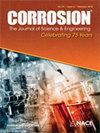The Accuracy and Efficiency of a Single-Level Fast Multipole Boundary Element Model for Analyzing Cathodic Protection of Large Pipeline Networks
IF 1.3
4区 材料科学
Q4 MATERIALS SCIENCE, MULTIDISCIPLINARY
引用次数: 0
Abstract
A single-level fast multipole boundary element method was developed for analyzing cathodic protection systems of large pipeline networks. This method was obtained by embedding far-field approximation within the traditional single-level fast multipole method. The far-field approximation was used for computing the coefficients for far elements within adjacent cells and determining the moments of the elements within far cells. This approximation reduced the difficulty of the procedures and programming leading to a significant decrease in CPU time. The Newton-Raphson method and GMRES were combined based on the proposed method to solve the nonlinear boundary conditions due to the polarization curve. Several cathodic protection problems were considered to verify and evaluate the method. The calculated potentials of this method were in good agreement with the conventional boundary element method, which was achieved by using pipe elements and quadrilateral elements to mesh the surfaces. Finally, the impressed current cathodic protection systems of a large network (more than 100,000 elements) and a complex urban gas network were investigated. The results indicated the capability, efficiency, and precision of the present method for solving large and complicated problems on a common desktop computer.大型管网阴极保护分析的单级快速多极边界元模型的准确性和效率
提出了一种用于大型管网阴极保护系统分析的单级快速多极边界元方法。该方法是在传统的单能级快速多极子方法中嵌入远场近似得到的。采用远场近似法计算相邻单元内远单元的系数,确定远单元内各单元的矩。这种近似降低了过程和编程的难度,从而显著减少了CPU时间。在此基础上,将牛顿-拉夫森法与GMRES相结合,求解了极化曲线引起的非线性边界条件。考虑了几个阴极保护问题,对该方法进行了验证和评价。该方法计算出的势与传统边界元法计算得到的势基本一致,后者采用管单元和四边形单元进行网格划分。最后,对大型网络(超过10万元件)和复杂城市燃气网络的外加电流阴极保护系统进行了研究。结果表明,该方法具有在普通台式计算机上求解大型复杂问题的能力、效率和精度。
本文章由计算机程序翻译,如有差异,请以英文原文为准。
求助全文
约1分钟内获得全文
求助全文
来源期刊

Corrosion
MATERIALS SCIENCE, MULTIDISCIPLINARY-METALLURGY & METALLURGICAL ENGINEERING
CiteScore
2.80
自引率
12.50%
发文量
97
审稿时长
3 months
期刊介绍:
CORROSION is the premier research journal featuring peer-reviewed technical articles from the world’s top researchers and provides a permanent record of progress in the science and technology of corrosion prevention and control. The scope of the journal includes the latest developments in areas of corrosion metallurgy, mechanisms, predictors, cracking (sulfide stress, stress corrosion, hydrogen-induced), passivation, and CO2 corrosion.
70+ years and over 7,100 peer-reviewed articles with advances in corrosion science and engineering have been published in CORROSION. The journal publishes seven article types – original articles, invited critical reviews, technical notes, corrosion communications fast-tracked for rapid publication, special research topic issues, research letters of yearly annual conference student poster sessions, and scientific investigations of field corrosion processes. CORROSION, the Journal of Science and Engineering, serves as an important communication platform for academics, researchers, technical libraries, and universities.
Articles considered for CORROSION should have significant permanent value and should accomplish at least one of the following objectives:
• Contribute awareness of corrosion phenomena,
• Advance understanding of fundamental process, and/or
• Further the knowledge of techniques and practices used to reduce corrosion.
 求助内容:
求助内容: 应助结果提醒方式:
应助结果提醒方式:


